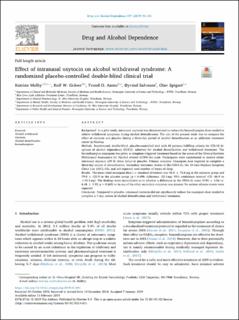| dc.contributor.author | Melby, Katrine | |
| dc.contributor.author | Gråwe, Rolf W. | |
| dc.contributor.author | Aamo, Trond Oskar | |
| dc.contributor.author | Salvesen, Øyvind | |
| dc.contributor.author | Spigset, Olav | |
| dc.date.accessioned | 2021-04-27T08:56:28Z | |
| dc.date.available | 2021-04-27T08:56:28Z | |
| dc.date.created | 2019-03-04T14:47:49Z | |
| dc.date.issued | 2019 | |
| dc.identifier.citation | Drug and Alcohol Dependence. 2019, 197 95-101. | en_US |
| dc.identifier.issn | 0376-8716 | |
| dc.identifier.uri | https://hdl.handle.net/11250/2739831 | |
| dc.description.abstract | Background
In a pilot study, intranasal oxytocin was demonstrated to reduce the benzodiazepine dose needed to relieve withdrawal symptoms during alcohol detoxification. The aim of the present study was to compare the effect of oxytocin and placebo during a three-day period of alcohol detoxification at an addiction treatment center in Norway.
Methods
Randomized, double-blind, placebo-controlled trial with 40 patients fulfilling criteria for ICD-10 diagnosis of alcohol dependence (F10.2), admitted for alcohol detoxification and withdrawal treatment. The benzodiazepine oxazepam was given as symptom-triggered treatment based on the scores of the Clinical Institute Withdrawal Assessment for Alcohol revised (CIWA-Ar) scale. Participants were randomized to receive either intranasal oxytocin (24 IU twice daily) or placebo. Primary outcome: Oxazepam dose required to complete a three-day course of detoxification. Secondary outcomes: Scores of the CIWA-Ar, the 10-item Hopkins Symptom Check List (HSCL-10), and self-reported total number of hours of sleep.
Results
The mean total oxazepam dose (± standard deviation) was 56.8 ± 72.8 mg in the oxytocin group and 79.0 ± 122.9 in the placebo group (p = 0.490; difference -22.3 mg; 95% confidence interval (CI) -86.9 to +42.4 mg). The findings were inconclusive as to whether a difference in the CIWA-Ar score (5.94 ± 3.86 vs. 6.48 ± 3.92; p = 0.665) or in any of the other secondary outcomes was present. No serious adverse events were reported.
Conclusion
Compared to placebo, intranasal oxytocin did not significantly reduce the oxazepam dose needed to complete a 3-day course of alcohol detoxification and withdrawal treatment. | en_US |
| dc.language.iso | eng | en_US |
| dc.publisher | Elsevier | en_US |
| dc.rights | Attribution-NonCommercial-NoDerivatives 4.0 Internasjonal | * |
| dc.rights.uri | http://creativecommons.org/licenses/by-nc-nd/4.0/deed.no | * |
| dc.title | Effect of intranasal oxytocin on alcohol withdrawal syndrome: A randomized placebo-controlled double-blind clinical trial | en_US |
| dc.type | Peer reviewed | en_US |
| dc.type | Journal article | en_US |
| dc.description.version | publishedVersion | en_US |
| dc.source.pagenumber | 95-101 | en_US |
| dc.source.volume | 197 | en_US |
| dc.source.journal | Drug and Alcohol Dependence | en_US |
| dc.identifier.doi | 10.1016/j.drugalcdep.2019.01.003 | |
| dc.identifier.cristin | 1682147 | |
| cristin.ispublished | true | |
| cristin.fulltext | original | |
| cristin.qualitycode | 1 | |

